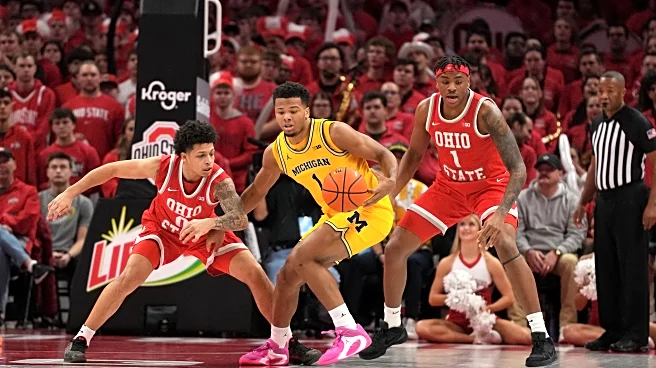Rapid Read • 9 min read
The wellness drink industry is under scrutiny following the Advertising Standards Authority's (ASA) decision to ban an advert by Trip, a well-known brand, for making prohibited health claims. The advert suggested that Trip's drinks could help with stress and anxiety, which the ASA ruled as a breach of its code. The functional beverage market, which includes drinks with added health benefits, has seen significant growth, with sales in British supermarkets increasing by 24.5% over the past year. These drinks often contain supplements like Lion's Mane extract, L-theanine, Ashwagandha, and magnesium, which are marketed as mood enhancers and stress relievers. However, nutritionists and dietitians express skepticism about the efficacy of these supplements in the small quantities found in the drinks. Despite the controversy, some consumers, like Lucy and Serena, find these drinks helpful in managing stress, although they acknowledge the limitations of their effects.
AD
The scrutiny of wellness drinks highlights the broader issue of health claims in the functional beverage industry. As the market grows, with nearly 30% of UK households purchasing these drinks, the accuracy of health benefits advertised becomes crucial. The ASA's ruling against Trip underscores the need for regulatory oversight to ensure consumer protection and prevent misleading claims. This situation impacts both consumers seeking alternative stress relief options and companies navigating the regulatory landscape. The controversy may lead to increased consumer skepticism and demand for scientific validation of health claims, potentially affecting sales and marketing strategies within the industry.
Following the ASA's ruling, Trip has made changes to its advertising to comply with regulations. The industry may face increased scrutiny and pressure to substantiate health claims with scientific evidence. Companies might need to adjust their marketing strategies to focus on taste and lifestyle benefits rather than unverified health claims. Consumers may become more discerning, seeking products with proven efficacy. Regulatory bodies could tighten guidelines, prompting brands to invest in research to support their claims. The ongoing debate may influence future product development and marketing within the wellness drink sector.
The controversy surrounding wellness drinks raises ethical questions about consumer trust and the responsibility of companies to provide accurate information. It also highlights the cultural shift towards non-alcoholic alternatives for relaxation, reflecting changing societal attitudes towards health and wellness. The industry's growth suggests a long-term trend towards functional beverages, potentially influencing dietary habits and public health. As consumers seek healthier lifestyles, the demand for scientifically backed products may drive innovation and research in the sector.
AD
More Stories You Might Enjoy













